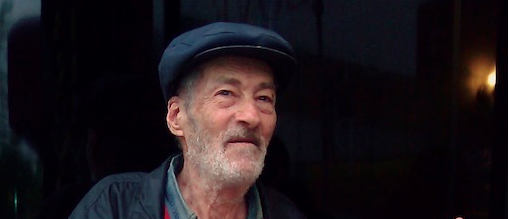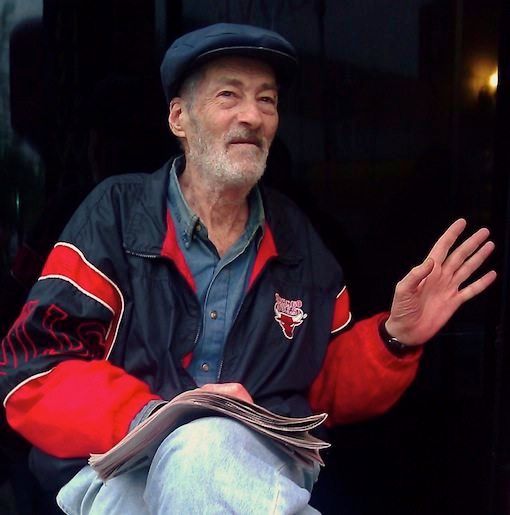Talking To Mauricio, Your Friendly Neighborhood Revolutionary


He’s known as Mauricio, and he is your neighbor. Before moving to Ditmas Park over 40 years ago, Mauricio came of age in 1950s Havana during Cuba’s bloody six-year revolution. Now unassuming and shrunken from the lean six-foot frame of his youth, he shuffles forward slowly, with a slight bend, in black socks and well-worn sandals.
Scratching the white stubble on his chin, Mauricio glances at the cloudless spring sky under the shadow of his hat brim and speaks of his encounters with radicalism and social upheaval. He slides into a lispy Spanish describing the chaos and brutality in the capitol during the final months of Fulgencio Batista’s dictatorship as Fidel Castro, Che Guevara, and Movimiento 26 de Julio approached. He discusses with reverence his zealous youth, and seems to mourn his revolution’s misspent potential.
“Youth pay the price,” Mauricio says, strolling down Cortelyou, of searching for a political and philosophical identity alongside university groups protesting in Batista’s streets. “I looked at Israel and Sweden, Russia,” he explains. “Stalin’s transgressions had not yet propagated through the Iron Curtain.”
As the culture of socialist ideology and the romanticism of change took hold, he found himself at university among some of Havana’s most fervent socialist rebels. Stopping outside of Café Madeline, he gestures at trendy passersby.
“We all had the look,” he says, hinting at the tenor and totality of Castro and Guevara’s charm and popularity among Cuban youth. He explains that while some of his peers were more radical than others, a certain style of dress or set of mannerisms quickly exposed dissenters. “We were easy to recognize.”
As President Batista grew more desperate, he sought to quell the rebellion through fear. He tried to “make examples.” There were public firing squads, and military responses to student protests.
“They fired into crowds of us indiscriminately,” says Mauricio, recalling a fellow student who once stood beside him being struck down in the chaos.
“I was more passionate than others,” Mauricio says between sips of coffee, recalling Cuba’s transition from the socialist republic of his youthful imagination to the practical reality global politics and Communism. It’s as if he’s reminiscing over a lost love.
By 1959, when Batista had fled the Cuba and Castro had entered Havana, Mauricio has finished his legal training and was offered a place as a functionary in the new government. Questions arose in his mind. “Something began to stink,” he says. “I wanted to know what wasn’t passing through my desk.”
Mauricio explains his socialist zeal and the infiltration of Cuba’s nascent government brought about dangerous contempt against him, which only increased as Castro solidified his power.
Mauricio’s duties allowed for travel. He was friendly with customs agents, providing simple gifts like shaving cream and deodorant, which Mauricio says were already unavailable at the time.
His rapport with the agents would come in handy. As competing governments sought a foothold in the new Cuba, Mauricio’s idealistic vision of a socialist republic moved away from him–and after accusing an official of passing information to a foreign agency, Mauricio was forced to flee to Miami.
“I left through the exit,” he says.
Mauricio initially hoped for a quick return to his home country. He existed in Miami’s community of Cuban exiles speaking only Spanish until he couldn’t take it anymore. “I waited for eighteen months,” he says. “They say mañana, mañana, tomorrow, always tomorrow.”
His faith eventually waned. He realized that the Cuba he envisioned would never be, and he has never returned.
Mauricio then moved to Lousiana, whose codified legal system could put his particular legal training to use–but he was soon dissuaded. He calls his experience there “a panorama of discrimination.”
So he moved to New York City and formed a successful business–a partnership with a childhood friend selling textiles and other goods–but it ended badly. Mauricio still wears the pain of this event, folding his hands together and leaning back.
Outside of the café, he greets friends and lights a cigarillo. He moved to the neighborhood for a fresh start in 1970, and he’s seen the relative eddies of social and economic change and shifting cultural demographics swirl around him ever since. He talks about who has occupied the neighborhood, beginning before he ever set foot here–from Dutch settlers to Irish, Italian, and Jewish families to a large Caribbean and African American population.
“This neighborhood has changed tremendously,” he says. “Gentrification… seems to be nonstop.” He waves his arm at the street in front of him. “Near complete commercial revamp… these are all new establishments.”
Mauricio has trouble climbing the steps to his apartment on the fourth floor, and rents are rising. Soon he’ll move on to cheaper, more accessible accommodations. For now, he spends much of his time at the Dorchester Senior Center, where he enjoys lunch, crosswords, and trivia.
“I am not a young man anymore,” he says, though his easy smile begs to differ. Past the lines on his face remains man passionate about social awareness–a man with conviction, even if he is buffeted by age, stairs, rising rents, and other practical considerations. He speaks with a “so it goes” tone of modern political unrest, rudderless youth, and rising inequality, stretching the apparent suddenness of present world issues over his wizened seventy-five years.
Hands behind his back, he begins making his way home, but he’s just barely stepped away before stopping to greet yet another friend. His name is Mauricio and he is your neighbor, but many of you already know.
About the author: Chris Credle is a writer from Brooklyn. His soul still hasn’t fully grown back since law school, but he’s almost certain that it will. He’s lived in Ditmas Park more than five years and has worked in publishing, finance, law, food service, and the breaking of big rocks into little rocks. He enjoys whiskey, and is an inconsistent frisbee thrower. You can reach him at chris.credle@gmail.com.



